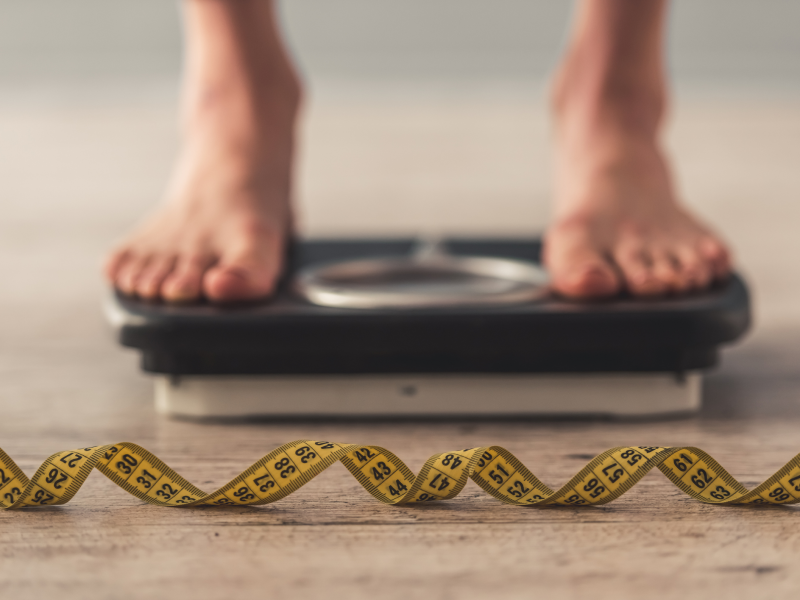- You can gain weight even if you’ve been working out regularly.
- Weight gain in periods when you’re working out could be muscle gain.
- But diet and stress levels can also contribute to your ability to lose weight.
It can be difficult to lose weight, as it often involves intense workout sessions and regular exercise routines. And it can be especially frustrating to gain weight when you don’t want to, especially if you’re striving to live a healthier lifestyle.
Unexpected weight gain might be muscle mass that’s building up, since muscle is heavier than fat. But there are several other causes of weight gain that have nothing to do with exercise.
Here are 10 reasons you could be gaining weight, even if you have good exercise habits.
You’re not eating a healthy diet.

Weight loss begins with a healthy diet, according to Dr. John Salerno, founder of The Salerno Center, where weight-loss management is one of several treatments offered.
"It starts with the diet, and I think you augment your life expectancy and the quality of your life by adding the exercise component," he told INSIDER. "They're both extremely important, and I think that we should all develop habits for both, meaning that you can't exercise and eat badly and you can't not exercise and eat well. You still have to have the two components together."
However, he added, people sometimes think when they exercise, they can "get away" with eating unhealthy foods and still lose weight.
"People that tend to exercise think they can get away with eating foods that they feel they'll burn off. It doesn't quite work that way," he said.
You're not practicing smart eating.

A healthy diet isn't only about eating healthy foods - you have to be smart about what kinds of healthy foods. You don't want to be eating or drinking empty calories, even if they aren't "bad" for you.
"What happens [when I eat or drink empty calories] is I'm hungry two hours later or an hour later," Irina Popa-Erwin, head nutrition coach and cofounder of NYC Health and Nutrition, told INSIDER. "Counting calories, we're not always making the best decisions. Because what is very important for a balanced meal is the amount of protein that we need per day."
"Protein is what supports your muscle," she said. "Metabolism is actually what helps your muscle burn the fat, but because with aging we don't absorb the same amount of protein or we don't eat the right amount of protein, the muscle doesn't have the fuel to burn the fat. So then the metabolism starts to slow down, and, of course, the body will start gaining fat and not be able to lose the weight, no matter how much you work out."
You're eating too much.

The amount of food you're eating could also be contributing to weight gain.
"A lot of times, exercise will increase hunger," Salerno said. "[People will] tend to actually eat a little bit more than they probably would have if they did [not] exercise. Not to discourage exercise, because it's still extremely important, but that can be an issue."
Of course, if you're hungry, you should eat, but it's worth taking a look at your eating habits and seeing if some of your eating is mindless or you're letting yourself go too long without eating, causing you to overeat.
Your "cheat days" are setting you back.

If you carefully count calories and eat smart all during the week, it can be easy to lighten up on the weekends and eat more junk foods that are high in salt and sugar, but Popa-Erwin warned that can be detrimental to your weight-loss efforts, especially if it becomes a weekly habit. It can prevent your body from moving towards your weight-loss goal.
"If we're going on that pattern, we lose, for example, 2 pounds, 3 pounds, and then the weekend comes and we repeat the process," she said. "I see this a lot."
You have a hormonal imbalance.

Salerno said about 80% of his patients have hormonal imbalances that have caused them to gain 10 to 30 pounds of extra weight.
"When weight starts coming down, the body tends to resist the weight loss, because the metabolism slows down from a sluggish or slowing thyroid," Salerno said. "The thyroid is the master regulatory gland, typically of metabolic function or of calorie burning. So at rest, you should be burning a certain number of calories, but if your thyroid gland is not functioning, you'll burn less and less. So it's the master regulatory gland of your body's whole system, but particularly for weight loss."
He said some of the ways you can control your hormones are exercise, destressing, good sleep habits, and good eating habits - particularly avoiding starchy foods that convert to sugar, which can cause hormonal imbalances and weight gain.
You're getting older.

As you age, your body's metabolism slows and you start losing muscle mass, so exercising like you used to might not cut it anymore if you're older.
"There are certain enzymes in our body that are not produced in the same amount," Popa-Erwin said. "That's why, when you go to the doctor, you do your blood tests and the doctor will say, OK, your Vitamin D - which is very common - or your Vitamin A or B is now low, because the body does not produce them in the same amount anymore."
You're stressed.

Stress is one of the most common factors to weight gain, Popa-Erwin said, particularly for women.
"[Cortisol] is a hormone that starts emitting during stress, when the stress levels are high," she said. "Once we produce cortisol, our digestive tract becomes a little bit inflamed and we start storing fat. … For women, if stress levels are very high, they can work out and lose [about] 8 to 12 pounds. That's it, and then we plateau. So that's very, very important, the stress hormone."
Your genetics are making it harder for you to lose weight.

Your genetic background, particularly in relation to your metabolism or insulin levels, could be behind your weight gain, according to Salerno.
"We can determine, genetically speaking, how severe their insulin and glucose genetically is affecting their ability to lose weight. … There is clearly a genetic component," he said.
But it is possible to overcome your genetics.
"You have to work harder, and you have to get your thyroid and your hormones regulated perhaps, but you can do it, absolutely," he said.
Your medications are making you gain weight.

Some drugs can cause weight gain as a side effect. According to WebMD, drugs to watch out for include depression medications, mood stabilizers, diabetes medicines, corticosteroids, medicines for preventing seizures and migraines, beta-blockers, and allergy relievers.
Dr. Holly Lofton, director of the Weight Management Program at New York University Langone Health, told INSIDER that there are generally alternatives in similar classes that won't cause you to gain weight, so you should talk to your doctor if that's an issue for you.
You have a medical condition that causes you to gain weight.

There are a number of medical conditions and deficiencies that can cause you to gain weight. One of the most common in women is polycystic ovary syndrome, or PCOS, a condition that causes an imbalance of reproductive hormones that can cause infertility.
Certain brain injuries can also cause weight gain. Injuries to the hypothalamus are particularly prone to cause weight gain because that's where the appetite centers are kept. However, there are certain medications that can help appetite management for people with this kind of medical condition.
Visit INSIDER's homepage for more.
